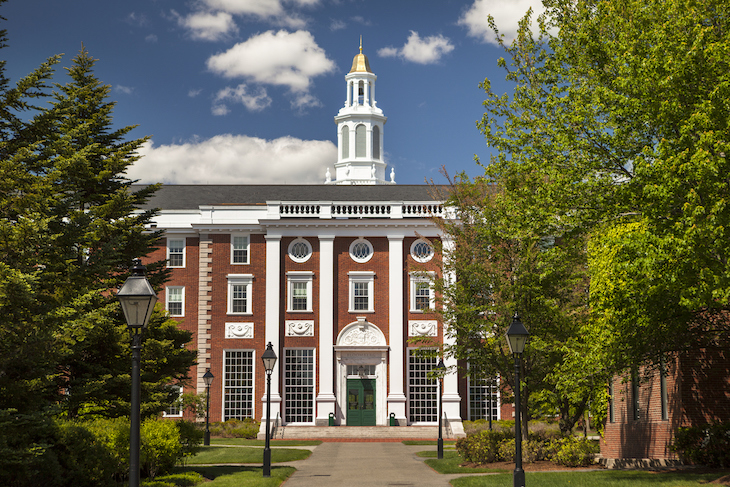Harvard university is at the centre of an unprecedented backlash after some of its students released an inflammatory statement claiming Israel was ‘entirely responsible’ for the Hamas attacks last weekend. There was widespread criticism of the statement, with Harvard alumni and distinguished public officials from across the political spectrum expressing their outrage. This was in stark contrast to university leaders, whose response was best characterised as slow, inadequate and appeasing.
Harvard’s initial response was pathetic in every respect
The public row was sparked by a joint statement, endorsed by more than 30 Harvard student bodies, saying that the Hamas attack ‘did not occur in a vacuum’ and that Israel was ‘entirely responsible for all unfolding violence.’ This is very much the world view of the activist student groups supporting the Palestinian cause, who often lead protests critical of Israel on campus.
Harvard’s initial response was pathetic in every respect. In a statement, university leaders failed even to acknowledge, let alone challenge, the claims made by the student bodies. Instead, the university offered this word salad:
‘We write to you today heartbroken by the death and destruction unleashed by the attack by Hamas that targeted citizens in Israel this weekend, and by the war in Israel and Gaza now under way.’
The statement was signed by Harvard President Claudine Gay and 17 other deans and administrators. Critics, who perhaps expected something better of America’s most prestigious academic institution, castigated its response to the Hamas attack.
‘This is outright terrorism, and terrorism is never justified,’ said Massachusetts Congressman Seth Moulton, a Harvard alumnus. Senator Ted Cruz, a Texas Republican who attended Harvard Law School, posed a simple question on X, formerly Twitter: ‘What the hell is wrong with Harvard?’ And former Harvard president, Lawrence Summers, lamented that in nearly 50 years of affiliation with the university he had never been as disillusioned or alienated: ‘The silence from Harvard’s leadership, so far, coupled with a vocal and widely reported student groups’ statement blaming Israel solely, has allowed Harvard to appear at best neutral towards acts of terror against the Jewish state.’
The sheer weight of criticism forced Gay into issuing a further statement, in which she condemned ‘the terrorist atrocities perpetrated by Hamas’ as ‘abhorrent’. Yet she still stopped short of directly rebuking the students, instead saying that ‘We will all be well served in such a difficult moment by rhetoric that aims to illuminate and not inflame’. Gay made clear that the student groups did not speak for Harvard or its leadership, but the damage was already done.
Harvard’s embarrassing failings were further highlighted by the response of other university leaders less minded to mince their words. On Saturday, Ron Liebowitz, president of Brandeis university, condemned ‘terrorism such as we have seen today perpetrated against innocent civilians.’ New York university publicly condemned the ‘indiscriminate killing of civilian non-combatants’ as ‘reprehensible’.
Harvard’s difficulties are very much a problem of its own making. In recent years the university, along with many other academic institutions, has made a habit of speaking out publicly on tricky and controversial social and political issues, such as climate change and police brutality. It is part of a general trend in higher education to curry favour by espousing fashionable viewpoints that chime with the latest orthodoxies. This approach is a long way from traditional notions of academic neutrality and leaves universities open to being interrogated about their positions on issues beyond the academic sphere. After the killing of George Floyd in 2020, and more recently in the case of Russia’s war against Ukraine, Harvard quickly issued public statements of solidarity. This makes it legitimate to ask why after the Hamas attacks — in which women and children have been killed — the university has been less than forthright in its response.
Harvard now finds itself at the centre of a political storm over why it is not speaking out more forcefully about the attack on Israel. The university had a duty to make clear that the free speech rights of its students and campus bodies cannot extend to glorifying acts of terrorism. It failed woefully at this task.







Comments